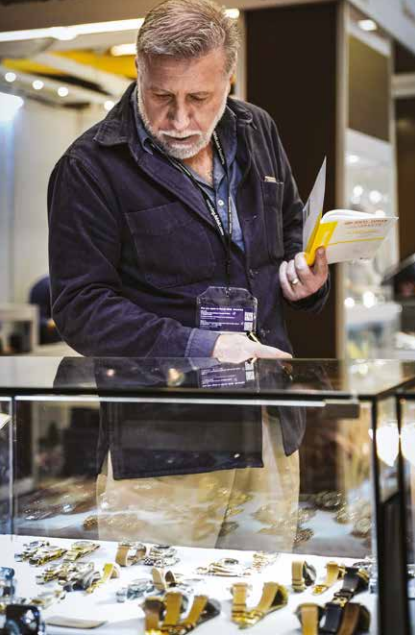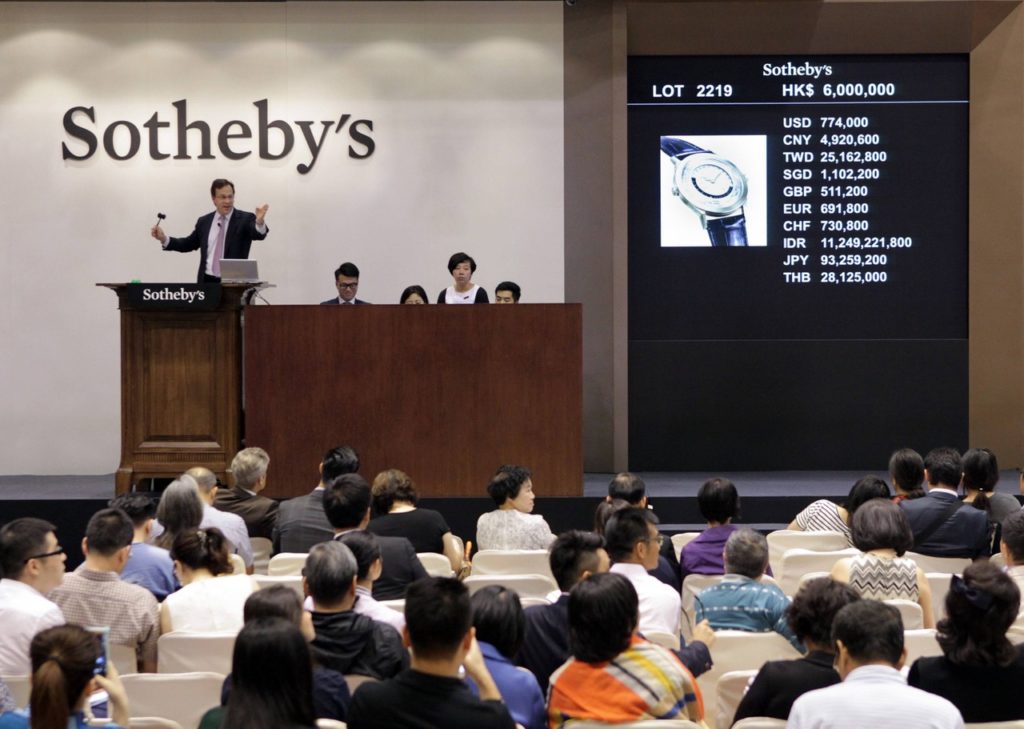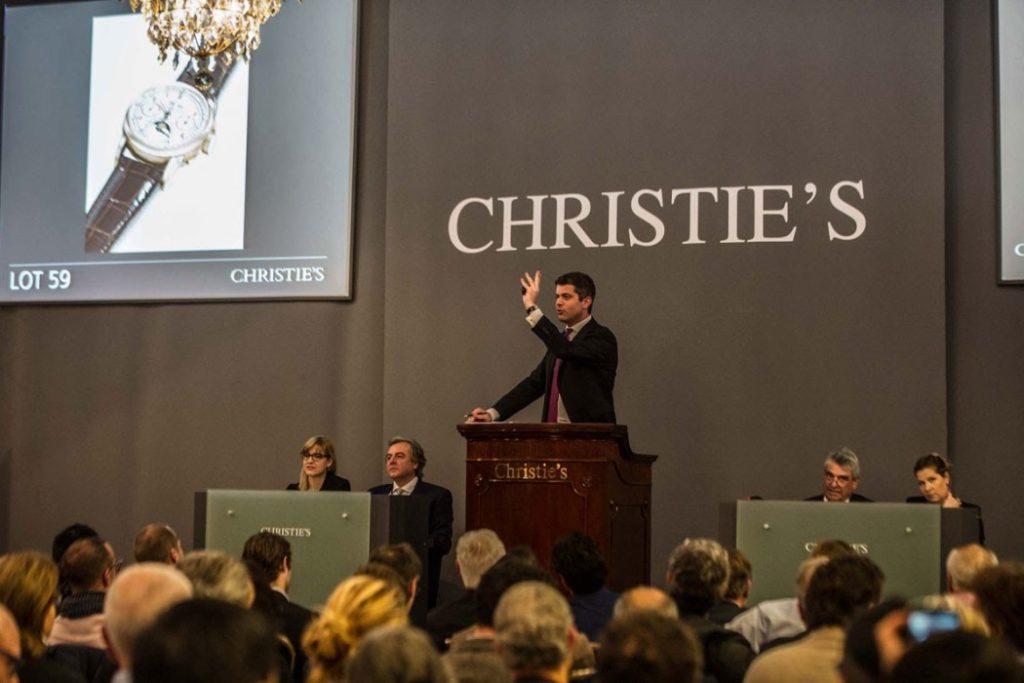 When Francesca and Fabiana asked me to write something for this issue, they also mentioned that the magazine’s cover would feature Phillips in association with Bacs and Russo. So, the first thing I could think of was to share a couple of thoughts regarding auction houses and how their role in the world of vintage watches affects this market. It is actually a question I have been asked when invited to speak at the Hodinkee10 panel in NY last fall: and, sure enough, it turned out I could think something different from, “Very important contribution!
When Francesca and Fabiana asked me to write something for this issue, they also mentioned that the magazine’s cover would feature Phillips in association with Bacs and Russo. So, the first thing I could think of was to share a couple of thoughts regarding auction houses and how their role in the world of vintage watches affects this market. It is actually a question I have been asked when invited to speak at the Hodinkee10 panel in NY last fall: and, sure enough, it turned out I could think something different from, “Very important contribution!
So helpful for the market! Such a great benchmark to learn about the value of watches!”.
In fact, I was the only one to offer a critical perspective, reminding everybody that – as a general rule – auction houses don’t do anything other than looking for inventory cheap enough to allow them to make a 25% commission in a market where even the highest qualified professionals average 15%. Obviously, this happens either at the expense of the unaware consignor, of the quality of the watches offered for sale, or of the unprepared buyer.
Furthermore, no market analysis is generally run, and inventory is thrown out there without the slightest clue of how the particular moment or other extemporaneous circumstances may affect the results: they cross their fingers hoping for the best, since buyer’s commission will be more as the hammer prices get higher, whether the client wins or loses. Selling the highest possible percentage of the offered lots is the only true concern of the department, as this is the only thing that the board will use evaluate the performance – and employment future – of every member of the team.
I have a whole collection of blood chilling stories about auction houses walking all over their own clients’ best interest just because they could but, believe it or not, these couple of paragraphs are not meant to denigrate auction houses. Public sales actually do offer some positive and interesting points as well. First, their sales’ records are public and can provide more than useful data to understand what’s going on in a market.
Also, they can give us a reasonable idea of what the true market value of a watch may be, if we are provided with some basic understanding of how to read the information. They give us – as sellers – the opportunity to reach a much wider basin of potential buyers, giving our items a much greater visibility than any other means would allow. This is a game changer if you are offering for sale something received with an estate, bought back in the day when the prices were a lot lower, or have a very, very special item that the dealer’s market is just not enough to understand and absorb.
As a buyer, you will be surprised of the opportunities to make amazing deals auctions may offer. Of course, you must be chasing a bargain, rather than a specific watch: like us dealers, who put a bid on half or more items on the catalog, hoping to nail just two or three good purchases. Seriously, if you think that the 25% buyer’s premium applied by the auction house makes all their watches too expensive, you are wrong: sadly for the seller, it is very possible that advantage may fall entirely on the buyer’s side. As far as which one is the best auction house out there, there are several variables that need to be taken into consideration.
 First of all, some may be best to sell, others to buy; then, location: some perform better in Geneva, others are only good in their home country, others yet can sell in places where the competition can hardly sell at all. So far as selling, by the way, keep in mind that an auction house is only as good as the person who is managing the department at a specific time, just like your bank branch is all about that one employee or manager who really takes your business at heart. And that, no matter how many centuries they have been around. I don’t think this is the place where I should share the personal experiences have had in the past with some of the major auction houses out there but, since this is this issue’s cover, there are a few things I can tell you about Phillips in association with Bacs and Russo.
First of all, some may be best to sell, others to buy; then, location: some perform better in Geneva, others are only good in their home country, others yet can sell in places where the competition can hardly sell at all. So far as selling, by the way, keep in mind that an auction house is only as good as the person who is managing the department at a specific time, just like your bank branch is all about that one employee or manager who really takes your business at heart. And that, no matter how many centuries they have been around. I don’t think this is the place where I should share the personal experiences have had in the past with some of the major auction houses out there but, since this is this issue’s cover, there are a few things I can tell you about Phillips in association with Bacs and Russo.
I have a love-hate relationship with these guys. In my intervention at the Hodinkee10 panel I had mentioned that there was one exception among auction houses with a habit of throwing watches out there regardless of the market and without any marketing strategy: I am glad to have a chance to say that I was referring to them. Aurel Bacs is a very tough negotiator and – most importantly – a rigid judge when it comes to selecting the best he can get. It may sound like a totally positive note, but wait until he raises his eyebrow before the watch you’re most proud of, and that you were thinking to do them a favor just offering it.
You will be surprised to learn how difficult it can be to consign a watch that really makes these guys happy, trust me: watches that most of the others will take without a second thought, in the blink of an eye, as long as the reserve price is right; be also prepared to see your offering turned down just because it’s simply not the right time in the market for it, or because there are already too many similar ones in the sales week your considering, and you would be the one taking the loss.
 They prefer not selling at all, as opposed to score a bad sale. Which, to some statistical extent, is nevertheless unavoidable every now and then. Conversely, items that some of their competitors may be fearful to include in a sale maybe because of a plain rumor or a technical detail they can’t simply understand and/or explain, they will consider and decide on based on their own internal investigation and due diligence, eventually accepting it: be assured that if the watch is accepted for a sale it’s because it checked all their boxes and no stone has been left unturned. So, Phillips in association with Bacs and Russo. As I said, dealing with auction houses in general involves certain challenges for both buyers and sellers, and this one certainly makes no exception. On the other hand, these guys make THE exception when it comes to innovative approach to the business, awareness of the existing market moment, rigid but outside influence-free lot selection parameters.
They prefer not selling at all, as opposed to score a bad sale. Which, to some statistical extent, is nevertheless unavoidable every now and then. Conversely, items that some of their competitors may be fearful to include in a sale maybe because of a plain rumor or a technical detail they can’t simply understand and/or explain, they will consider and decide on based on their own internal investigation and due diligence, eventually accepting it: be assured that if the watch is accepted for a sale it’s because it checked all their boxes and no stone has been left unturned. So, Phillips in association with Bacs and Russo. As I said, dealing with auction houses in general involves certain challenges for both buyers and sellers, and this one certainly makes no exception. On the other hand, these guys make THE exception when it comes to innovative approach to the business, awareness of the existing market moment, rigid but outside influence-free lot selection parameters.
All in all, prerogatives that may make dealing with them more difficult in many a way, but that certainly grant more clarity, unequivocal intentions and above market grade due diligence on all acquisitions. This said, obviously perfection is not of this world, and everyone can make a mistake every now and then: but I’ve got to say that these guys – albeit in their own way – strive to make as few as possible. Now, I have a great deal of inventory consigned with them, and the odds – that I openly accept – are that I may not be happy with the results. But that also means that a good number of buyers will have made an incredible purchase, so let the true market have the last word.
For more information on the article, you can Download it here.

Thank you for this article. I applaud your courage in expressing your honest and well earned assessment. Very thoughtful article.
This is the kind of insight that makes blogging so important. Thank you for sharing your time and expertise in such an honest way. I can see now why JCB said that he only buys from Aurel.
Thank you for checking in, Pete. Let me point out that doing business with auction houses – both as sellers or buyers – is not a bad idea per se: only, it’s advisable that you know what your doing, or have proper advise. I am not even saying that Phillips is the only auction house out there that we should buy from: each auction house out there can source you the deal of your life. I just commented on some prerogatives of their way of doing business that I considered worth sharing. That’s all!